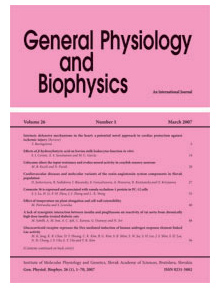Journal info
Aims and Scope |
||
Select Journal
Journals
Bratislava Medical Journal Endocrine Regulations General Physiology and Biophysics 2024 2023 2022 2021 2020 2019 2018 2017 2016 2015 2014 2013 2012 2011 2011 Special Issue 2010 2009 2008 2007 Neoplasma Acta Virologica Studia Psychologica Cardiology Letters Psychológia a patopsych. dieťaťa Kovove Materialy-Metallic Materials Slovenská hudbaWebshop Cart
Your Cart is currently empty.
Info: Your browser does not accept cookies. To put products into your cart and purchase them you need to enable cookies.
General Physiology and Biophysics Vol.30, No.1, p.11–19, 2011 |
||
| Title: Effects of aldosterone and mineralocorticoid receptor antagonism on cardiac ion channels in the view of upstream therapy of atrial fibrillation | ||
| Author: Roman Laszlo, Kerstin Bentz, Juergen Schreieck | ||
| Abstract: Atrial fibrillation (AF) is the most common sustained arrhythmia in man. Over the past years, importance of the renin-angiotensin-aldosterone system in AF pathophysiology has been recognized. Lately, the role of aldosterone in AF pathophysiology and mineralocorticoid receptor (MR) antagonism in “upstream” AF treatment is discussed with special regards concerning the effects on AF-induced structural remodeling. However, there is more and more evidence that MR antagonism also influences atrial electrophysiology and, respectively, AF-induced electrical remodeling, whereas the molecular mechanisms are almost unknown. The aim of this mini-review is to give an overview about the role of aldosterone in AF pathophysiology in principle and to summarize current available data concerning affection of cardiac ion channels by aldosterone and MR antagonism. Finally, as modulation of oxidative stress is discussed as one main therapy principle of “upstream” treatment of AF, potential mechanisms how modulation of oxidative stress by aldosterone and accordingly MR antagonism might alter atrial ion currents are delineated. Summarized, publications concerning potential mechanisms of aldosterone- and MR antagonism-modulated cardiac ion channels in various experimental settings are almost exclusively limited to the ventricular level and, partly, they are also contradictorily. Translation of these data to the atria is problematic because atrial and ventricular electrophysiology exhibit remarkable differences. It can be concluded that further research on the “atrial level” is needed in order to clarify the potential impact of the affection of atrial ion channels by aldosterone and accordingly MR antagonism in “upstream” therapy of AF. |
||
| Keywords: Atrial fibrillation — Atrial remodeling — Aldosterone — Mineralocorticoid receptor antagonism — Upstream therapy | ||
| Year: 2011, Volume: 30, Issue: 1 | Page From: 11, Page To: 19 | |
| doi:10.4149/gpb_2011_01_11 |
||
|
|
 download file download file |
|
|
2011 Special Issue |

